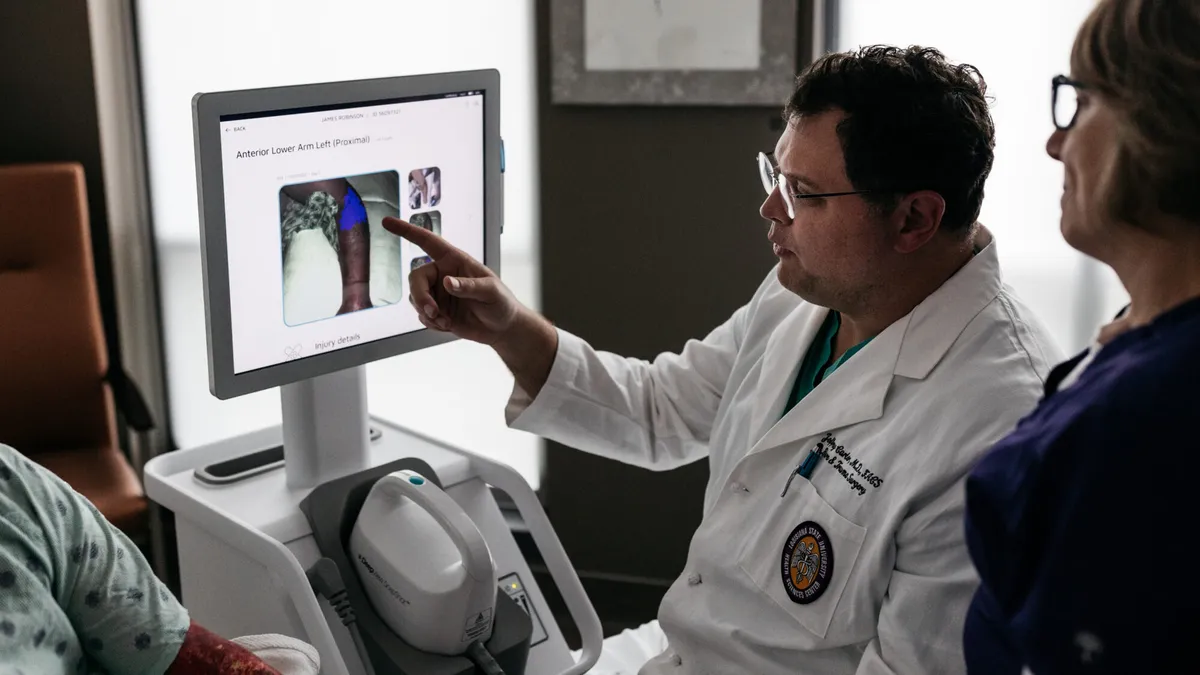Medtronic went on the offensive last week against its main competitor in transcatheter aortic valve replacement, presenting post-market data that showed its Evolut TAVR system outperformed Edwards Lifesciences’ Sapien device in a subset of patients, mostly women, with small annuli anatomy.
The aortic annulus is a fibrous ring around the heart’s valve. Medtronic said it launched the head-to-head study because it was particularly interested in understanding how the two most frequently used TAVR systems perform in women, who tend to have smaller heart valves.
The results, presented at the American College of Cardiology annual meeting, one of the largest U.S. cardiology conferences, showed patients who received an Evolut valve saw far less valve dysfunction at one year than those who got a Sapien device.
However, Edwards, along with several Wall Street analysts, were unimpressed with the findings. An Edwards spokesperson said a large body of existing evidence backs the successful use of its TAVR platform in women, and analysts questioned whether the new data would compel physicians to change their valve selection in practice.
“The 1-year outcomes reported in the Medtronic-led [Smart] study, which was not an FDA approved trial, do not reflect contemporary experience in clinical trials or real-world evidence with the Edwards [Sapien] 3 TAVR platform,” Edwards spokesperson Amy Hytowitz told MedTech Dive in an email. “The platform is used successfully every day worldwide in the patient population targeted in Medtronic’s study.”
Medtronic’s Nina Goodheart, president of the structural heart and aortic business, said in a statement the Smart study data “reinforce the company’s commitment to driving health equity and engineering the best technology to solve unmet patient needs."
On Medtronic’s earnings call in February, Sean Salmon, president of the cardiovascular portfolio, said patients with smaller annuli make up about 40% of the global TAVR market, and the company is targeting the population as a growth catalyst.
Hytowitz said Edwards’ valves achieve excellent patient outcomes across all valve sizes and genders, noting more people have been treated with Sapien than with any other transcatheter heart valve technology.
“Women tend to have even better outcomes with Edwards [Sapien] TAVR,” she said. “Women have always been an important part of Edwards clinical trials.”
Medtronic’s new study, which was published in the New England Journal of Medicine, showed the Evolut valve was superior to Sapien on the primary endpoint of valve function. The trial found 9.4% of patients with small aortic annuli had bioprosthetic valve dysfunction 12 months after treatment with Evolut, compared with 41.6% of patients who received a Sapien valve.
Evolut met a non-inferiority endpoint comparing rates of death, stroke and heart failure rehospitalization at one year.
The majority of patients (87%) in the 716-person Smart trial were women.
Baird analyst David Rescott, who attended the ACC conference, said the Smart trial results don’t appear clear enough to drive a meaningful shift among implanting physicians, especially considering differences in Edwards real-world results vs. those seen in Medtronic’s study. Publication of longer-term data on mortality and rehospitalization benefits is likely years away.
“We find it unlikely that these results would meaningfully shift share at least over the next two years,” Rescott said in a research note.
William Blair analyst Margaret Kaczor Andrew, who also attended the meeting, said clinicians expressed concern that misuse of definitions in the trial could have led to discrepancies in the results.
“We believe this data will continue to raise questions among clinicians, as it has already this weekend, and may lead to limited share shifts in the coming quarters,” Kaczor Andrew wrote in a note to clients. “That said, Edwards has remained the market leader and clinically supported performance in its Sapien platform, which we expect to continue.”
Truist analyst Richard Newitter said it was unclear whether the study data would move the needle on clinical use, writing that the results seemed “inconsistent with real world experience with the Sapien valve.”
Medtronic said all patients in the Smart study will be followed for five years to assess valve performance in patients with small annuli.


















